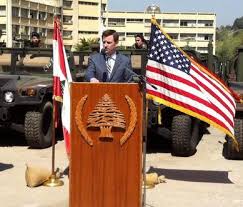
By Joseph Kechichian, Senior Writer
Beirut: A few days after Moscow deployed several warplanes to a Syrian airbase near Latakia, presumably to prop up the regime of Bashar Al Assad which lost significant ground to rebel forces since the beginning of the year, Washington reiterated its ongoing support to the Lebanese Armed Forces (LAF), as it announced the disbursement of fresh funds to acquire defensive weapons.
“I am very pleased to announce today that my government is allotting an additional $59 million for border security equipment for the army,” declared US Ambassador David Hale after meeting Prime Minister Tammam Salam at the Grand Serail [Government House] on Wednesday.
Except for the Kingdom of Saudi Arabia, which offered a $3 billion grant to Beirut in late December 2013 to purchase weapons from France—another $1 billion was added in August 2014 to boost the country’s counter-terrorism forces—the United States was one of the few countries that stood by Lebanon, and for so long.
It provided more than $1.3 billion in security assistance during the past decade alone, including Tow II anti-tank launchers and missiles as well as 18 new Bell UH-1H Huey helicopters.
In 2015, Lebanon became the fifth largest recipient of US foreign military financing and the fifth largest annual recipient of US bilateral training programmes.
Equally important, the US “provided nearly $1 billion in humanitarian assistance to host communities and Syrian refugees in Lebanon since the tragic conflict in Syria began” and, according to Hale, Washington also gave Beirut “bilateral development assistance for the last decade [that] also exceeded one billion dollars, to help income generating opportunities, education, and provision of services such as water.”
Interestingly, the ambassador revealed that Washington “received the latest, substantial transfer of funds from Saudi Arabia to purchase more US equipment to help the Lebanese army,” which meant that part of the $4 billion dollars grant allocated by Riyadh would be spent outside of France.
What Beirut desperately needed was to develop a precision air force strike capability, which was a marked improvement on past vetoes that prevented the Lebanese army from acquiring such an ability on account of Lebanon’s geo-political proximity to, and ideological differences with, Israel. In the aftermath of the Syrian civil war, however, leading international powers emended their perceptions of the dangers lurking all around Lebanon and actually set up an International Support Group to extend sorely needed assistance.
The partnership fostered by Saudi Arabia with both France and the United States ensured that the Lebanese army’s core capabilities to defend the country’s borders and people were no longer mere wishes. In light of the Syrian tragedy, which threatened to drag Beirut in yet another conflict, Washington seemed determined to protect the small country, especially now that ongoing clashes all along its borders with Syria brought Russia into the equation.
A few days ago, Russia and Israel agreed to coordinate their activities and to presumably avoid clashes, which required Lebanon to remain alert and protect itself as necessary. The latest US assistance intended to mitigate putative confrontations even if the Lebanese army’s overall strength was rather limited.